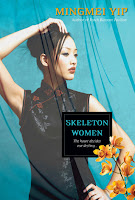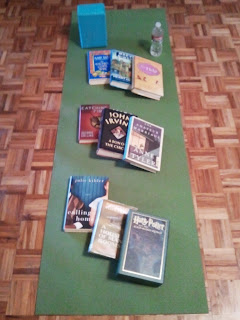 |
| Photo credit: SAN_DRINO's Flickr Photostream |
You might (or might not) find it interesting to learn that I read reviews for lots of books besides Calling Me Home. Yes, I read reviews of my own book, too. I freely admit that authors with the fortitude to avoid their own reviews are far stronger—and maybe smarter—than I am. But I do often read whole strings of reviews on Amazon or Barnes & Noble or Goodreads about other people's books. Why? Well, I'm curious what readers are looking for in stories—what they love, what they dislike or even hate, what causes them to want to run out and tell their entire contingent of friends and family to read the book they just finished, or what causes them to close a book, throw it against a wall, and say, "I could never recommend this."
I think these are all fair reactions. I honestly do. After being a human being for what feels like an unreasonably big number when I look at it in years, I've learned that it takes all kinds to reach all kinds. Some books are just not for me. Some books are just not for you. Heck, my book may not be for you. Good thing there are so many books out there to please all our personal preferences, right?
But I've noticed an interesting and somewhat disturbing trend lately when reading reviews—sometimes for my book, but just as often, for other people's books. (In fact, what inspired me to write this post was a recent review of someone else's book, so no need to go hunting anything or anyone down on my behalf--ha!) It goes something like this: "This book was terrible. I can't believe all the good reviews here. I wouldn't have picked it up except for all the blurbs saying how wonderful it was. These people were so wrong. You can't trust blurbs (or good reviews or word-of-mouth recommendations or … fill in the blank) anymore. I'll be suspicious of them from now on."
Huh?
What it boils down to is this person has single-handedly decided the book was terrible and didn't warrant any positive reviews from readers or positive blurbs from other authors simply because, well ... they didn't like it.
I sometimes take negative reviews of Calling Me Home very much to heart. Sure, I know that the book I set out to write is written and published and there's nothing I can do to change it. It's done. But sometimes people make astute observations that I file away for future use. I'm not a perfect writer by any stretch of the imagination. Who is? There's nearly always room for improvement, and anyone who believes otherwise about their own work is delusional. One of the hardest decisions a writer makes before sending a manuscript to an agent or editor is, "Can I let go of this? Even if I know it's not perfect and never will be? Is it the best I could do with the resources at hand?" (And again, if you're not asking yourself this question, you might be delusional, and chances are, it's really not ready—just sayin'.)
But it's still interesting, after the fact, even when it's too late to change anything, to see what people were bugged by. What made them stop reading at certain points? What made them rate the book less stars than the full number available? Sometimes the reasons are simply personal preference, but sometimes they are valid points. Sometimes they are things that make me think, "Yeah. That's good stuff. Next time, I'll want to think harder about that kind of thing." And sometimes I look at the same kind of critique of other people's books with interest, considering it a free continuing education in writing lesson.
But when I read a review of the type I've mentioned earlier—the review that leaves no room for any argument, that pronounces a book terrible, period, and calls all good reviews wrong—I shrug. If it's my book, it has nothing for me. If it's not my book, it has nothing for the other author. And most of all, it has nothing for the prospective reader who may come along and peruse the reviews to decide whether to read the book. My biggest question is, why does the person bother to post a review like this at all if there's no room for any other opinion? Is it some sense of feeling vindicated? Is it that they were able to have their feeling of being wronged somehow reversed by writing this type of review?
Sadly, I think it's a sign of our times, and it's an attitude that prevails in many, many arenas. "I'm right. You're wrong. Discussion over."
Noticing this has made me more conscientious of situations in which I have made similar pronouncements. "Oh my gosh, that movie was horrendous … what on earth did anyone SEE in it? Why would they even bother? Why are all these critics calling it genius?" It makes me take a step back and think, what is it about this movie or song or book or new kind of food that has people so excited? What am I missing? If I study it from all angles and still come up short, I have to think, "It's just not for me." In which case, it's probably better to shrug and go about my business than try to build a case of Julie Versus The World.
I have better ways to spend my time, don't you?









